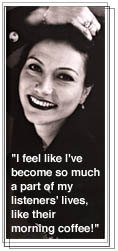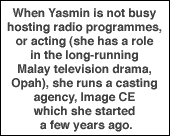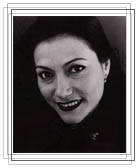
... continued from page one

So what does she think about that? "I feel like I've become so much a part of my listeners' lives, like their morning coffee!" she muses. "I don't think I'm a popular deejay; I'm just doing my job." If only it were as simple as that!
There is as yet no formal training for radio deejays, nor are there courses on how to improve one's deejaying style. It has to come from trial and error and learning from others. For Yasmin, it's a lot of both. When she travels overseas, she brings along her walkman and leaves it on to record the radio programmes, and she would bring back dozens of tapes which she would listen to carefully, studying techniques and picking up things she could use on her shows.
Her influence on radio has been far-reaching. She has increased sales of things she promoted, brought the past back by playing recordings of old plays, even made her listeners do the unthinkable, like crowing on the Ayamas show! For a while, Ayamas' advertising agency was dubious about the crowing bit, but Yasmin convinced them that listeners would do anything if it would win them a prize. And sure enough, they crowed. Lustily too!
Yasmin bursts into peals of laughter. "Can you imagine a mother, while waiting for her children after school, sitting in her car and crowing like a chicken into her mobile phone?" Yeah, I'd be mortified if I did that and found passers-by staring at me and thinking I must have gone off the rocker!
"The thing about radio is that it's personal. When I'm on the air, I'm talking to my listeners one-on-one. I imagine what they are doing. It could be a person getting ready for work, a husband and wife in the car on the way to the market or somewhere, the housewife doing her chores at home after she has sent her husband and kids off."
At the studio, Yasmin says she runs a one-person show in the mornings. Whenever she's on duty, she has to answer the phones, play the commercials - popping into the player as many as 100 commercial cartridges during her three-hour morning show - play her CDs, run her contests and phone-in chitchats, etc. All for RM40 an hour, she reveals. A paltry sum, yet she can remain very cheerful on the show, so much so that once, a listener called in to ask," Yasmin, why are you so cheerful every day? Don't you have any problems?" Yasmin glibly answered, tongue-in-cheek, "Why, you want to hear about my problems?"
She asks, rather vehemently. "Why should I be depressed? In the past one year, I've never taken a single sick day off , except when I had a little accident some time ago."
Her influence on radio does not extend to just the products she promotes or the music she plays. She comes up with a lot of original ideas to make her programmes interesting, an important fact to note if you are on air almost every day. One contest, What's That Sound? is so popular that it has spawned a number of copycats; it even became the object of a contest on a 600 number.
"A lot of people don't realise that What's That Sound was a concept that originated from me. In fact I run the entire contest completely on my own which includes thinking of sounds, getting people to sponsor the prizes and arranging to collect the prizes for the winners. Nobody else helps me and there is no sponsor for that part of my work," she says in an injured tone.
If there's one thing that Yasmin can't understand is people calling up to offer guesses even before the contest has started. Another thing she detests is that after she has described the prize and told those who are not interested in that particular prize not to call, people would still call up. "As long as there's something to win, why not?" she fumes at the callers' attitude. Must be the kiasu bug we have caught from our southern neighbour, I suggest.
She continues, "For instance, if the prize is a golf set, I stress on the air that only those who play golf should call up but Malaysians being Malaysians, they call up as long as there's a contest and prizes to be won. The winners sometimes even attempt to get me to change the prizes for them!"
She continues the harangue: "In America, radio deejays give away things all the time - concert tickets, movie tickets, whatever - throughout the day. Here, when I inform listeners that the prizes will be announced at 7:00 p.m., people start calling me at 6:45 p.m.. I could pick up 20 calls asking whether the contest has started. Now I just answer, `Do you have a radio?' or when I'm really not in the mood, `I don't know; you tell me!'
"It's the same thing on Patrick's show. People would call up and ask, `Is this Radio 4?' when they know very well it's the number of Radio 4 that they have dialled."
Yasmin envies radio deejays in Western countries who can get away with almost anything and have the latest technology in radio broadcasting to help make their shows more interesting and unique. Some of the newer stations in Malaysia have computerised their studios, but over at Radio 4, everything is still being done manually. Yasmin puts it down to budgets and the redtape of bureaucracy.
Ever realised why, when she's on the air, Yasmin is so smooth in her delivery and is able to get every word down pat, well, almost. The answer? Scripts. Yes, Yasmin is a stickler for scripts for all of her shows.
She reveals, "Most people don't believe that I actually prepare scripts for my shows. It helps me to sound natural, smooth. I can't stand starting a sentence and then finding myself uttering uhh, hmm, or using the wrong grammar because I can't find the words to continue. If I want to say a sentence that has more than 10 words in it, and it's got a message, I write it down."To show what she means, she lets me look at the script for her Royal Selangor Pewter Show which she is due to go on two hours after the interview, and there it is, beginning with "A very good Wednesday evening to you. How was your Deepavali celebrations? Did you have enough muruku...?"
She says a few lines for my benefit, complete with correctly placed intonation and rise and fall of her voice. She writes all her own scripts for her sponsored shows, even for her morning shows. Which is why when you hear her on the air, she sounds so fluent and articulate, seldom a word, phrase or sentence wrong, as though she talks like this all the time. In person, she speaks fluent English, but lapses into the occasional lahs. Of course there have been times when she has had to improvise but she has still managed to come out with a smooth prattle.
When Patrick comes on air with her, you'd think they have an off-the-cuff conversation because it sounds so natural. Instead, Yasmin reveals that she and Patrick plan beforehand what they are going to say - the punchline, the ending, who'd say what, etc. "Sometimes he'd think of things to say, or I would come up with something. When I say `I spent the whole of last night thinking about what I'd do for the show,' I actually did do that," says Yasmin.
Despite well-known radio hoaxes - from the US radio performance of War of the Worlds when listeners actually believed that aliens had landed on Earth to the more recent April Fool duck fiasco by Patrick Teoh - people have a tendency to believe what they hear on the radio, observes Yasmin.
"If I tell them I bumped my head on the door because I'm too tall, they'd believe it," she gives as an example. "They even believed that Angie Ng was in a wheelchair!" Without batting an eyelid, she states, "We play jokes on one another (the deejays). It's all very professional."
When asked about Patrick's traits that endear him to her, Yasmin raises an eyebrow. "Endearing?" she bursts into laughter. With a glint of mischief in her eyes, she deadpans, "Well, for one thing, he's small. You can pat him on the head!" Then she sobers up, "He's quite sensitive to public opinion, despite his outside displays. Obviously, nobody likes to be slammed in the face. But you'd never hear people say `Patrick's so rude; I'm not going to listen to his shows again.'" On the contrary, it seems that the ruder, the more controversial Patrick is, the more popular his programmes become.
"He's not like that in real life," she insists. She relates how, when Patrick agreed to deejay Rhythm of the Nation, he was going to create a character that listeners would relate with the show. "Within a month, he succeeded," she says, amazement in her voice. "Indeed, he had the nation eating out of his hand." On the air, he was controversial, rude, cut people off in the midst of conversations, hung up on people, etc, but all these did was earn him the media's attention and miles of publicity.
By association, however, it wasn't easy for Yasmin. "It was awful for me. I would be in a restaurant and a stranger would come up to me and pat me on the shoulder and say, `Can you tell your friend Patrick not to be so rude?'"
This aside, Yasmin looks up to him as the wise old man of the industry. "I'm still in awe of him. He's been in the business for so long. Praise from Patrick Teoh is something. If he says something horrible (about your show), then you go into depression for a week," she winces.
When Yasmin is not busy hosting radio programmes, or acting (she has a role in the long-running Malay television drama, Opah), she runs a casting agency, Image C E which she started a few years ago. The bulk of her company's business is casting talent for commercials and advertisements. Her office walls are adorned with newspaper cuttings and posters of her "talents" at work, and many of her girls make Page One Girl in the Malay Mail. In fact, for a while, her company was the biggest casting agency in the market in terms of number of talents, billings, etc. But it doesn't mean that her company was profitable. Yasmin admits that it took her three years before the business started making money. Meanwhile, she had to use her personal income to bankroll the agency's overheads and pay her staff's salaries.
However, Yasmin mourns the lack of professionalism and respect shown towards talents. "Sometimes, at a product shoot where I am the talent, I have to go up and introduce myself to the product client and sell myself to her or him, and all the client does is look me up and down. I feel that if the product is so important to you, you should give the person selling your product some respect and take the trouble to know that person. Otherwise, why don't you sell the product yourself?" she exclaims.
To get off the subject of her career, I ask, "Do you ever see yourself as a doting mother?" She hoots, "Yes, I had that phase - and it lasted half an hour. Thank goodness, it passed!"
Finally, I ask: "Where do you see yourself five, 10 years from now?"
She pauses to think about it, and says maybe the same as what she is doing now. After all, one has to earn as much as possible while one is still capable of doing so. Then she brightens up, as if a thought had just occurred to her, "Maybe I'll be Auntie Yasmin. I could say on the radio, `When Auntie Yasmin was young, I used to....'" she says amidst peals of merriment. Well, she might find herself talking to a whole different segment of Malaysian listeners, and Malaysian radio might not be the same. For one thing, listeners would have dozens of channels and stations to choose from. And for another, there might be a few deejay gems yet to be discovered. But there's no doubt about it: Yasmin Yusuff will be remembered in the history of radio deejaying.


